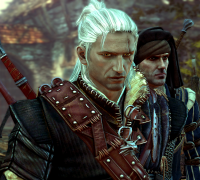Poles at the Vanguard of Video Game Arts
When President Obama visited Poland in May, Prime Minister Donald Tusk presented him with a gem from the crown jewels of the nation’s culture, an intricate, stunningly executed work of art. This treasure, The Witcher 2, is a first rate videogame released earlier this year.
The game, released by Polish studio CD Projekt RED, puts Poland at the vanguard of the burgeoning videogames-as-art movement. With gorgeous art, an intelligent, adult story and complex characters, The Witcher 2 is already one of the most critically acclaimed games of the year.
The world of the Witcher 2 is spun from a series of darkly beautiful novels and short stories written by Polish writer, Andrzej Sapkowski. Sapkowski imagines a fantasy world that evokes Europe circa 1271, in which humans live side by side with dwarves, elves and frighteningly grotesque monsters. Gamers play Geralt of Rivia, a burly, silver haired “witcher,” or professional monster-slayer, who must survive in a menacing world where the dark side of human nature is as fearsome as the monsters.
The game is artfully rendered in loving detail. In every scene artists thought about appropriate flora, weather and architecture, and a walk through the forest is accurately sun-dappled.
“It’s a work of art,” said professional games journalist Jordan Baughman. “It’s very true to the source material.”
Baughman was so inspired by the games that he read all available English translations of Sapkowski’s works.
“The political factions, people from different regions, clothes, everything looks the way it is in the books,” he said.
The game developers pride themselves on asking players to make tough decisions with real consequences.
For instance, at one juncture of the game, there is a king who oppresses his own people and constantly threatens the nations that surround him with occupation and subjugation. Geralt must decide whether to kill him, freeing the downtrodden citizens, or whether doing so would create a vast power vacuum inviting something far worse.
It is a question that would not be out of place in a spy movie, a Tom Clancy novel, or even a president’s war room.
Like in real life, dark problems such as racism, greed and society’s worst vices are juxtaposed against the beauty of the natural world. The difficult decisions the game poses, as well as the head-on confrontation of mature subject matter like torture and prostitution, make the game adults-only entertainment. However, sex and violence never seem gratuitous in the Witcher. Rather, their inclusion stays true to Sapkowski’s original source material and ensures that the game is not “dumbed down” to achieve a particular rating from the Entertainment Software Ratings Board.
Not all of the adult content is violent or sexual, however. Part of the mature nature of the game is in the difficult choices Geralt makes as he navigates the landscape of the Witcher 2.
“In most games, you make a choice, and you see the outcome almost immediately,” John Mamais, executive producer, said. “In our games we are trying to design it so you don’t see the effects of your choices until much later in the game.”
Michał Nowakowski, vice president of business development at CD Projekt RED, sees this element of the game as true to real life. “In real life when you make a choice, you are never 100% sure what will be the effect. You only find out what happens as this life goes on.”
Gamers and the videogame industry have grown immensely in scope and scale over the last two decades. Games today have the multi-million dollar budgets of blockbuster movies and take teams of professionals to produce. In short, these aren’t the pixilated arcade games from the pizza parlors of yore. The Witcher 2 treats its players as adults. “This is not a Grand Theft Auto type of thing,” Baughman said.
Neither of the games in the Witcher franchise ever ventures into moralizing, but Baughman sees relevant parallels to our own world. In the game, dwarves are treated very poorly and exist in the margins of society. Even witchers like the title character face slurs and discrimination.
“Racism is always a current topic,” Baughman said, “People are different, and they have to learn to live together.”
Baughman has played The Witcher 2 three different times, a testament to his fondness for the game given that each time represents at least 25 hours of play. He learned hands-on how subtle decisions lead to a completely different way of experiencing the game. Each time, “you are introduced to an entirely new storyline with different characters and different missions. I’ve never seen a game that changes so much.”
The game, which is currently only available for the PC, will be released for consoles soon. This should give it an even wider audience than the first Witcher, which was made only for PCs.
The Witcher 2 has a suspenseful cliffhanger ending, and critics like Baughman are eager for a third installment.
While Sapkowski drew greatly from Slavic mythology in creating his stories, there are few distinctive Polish features in the game, and it has the potential to be enjoyed by a wide variety of gamers—not only dedicated fans of the role-playing games.
“It’s fantastic intellectual property,” Baughman concluded.


